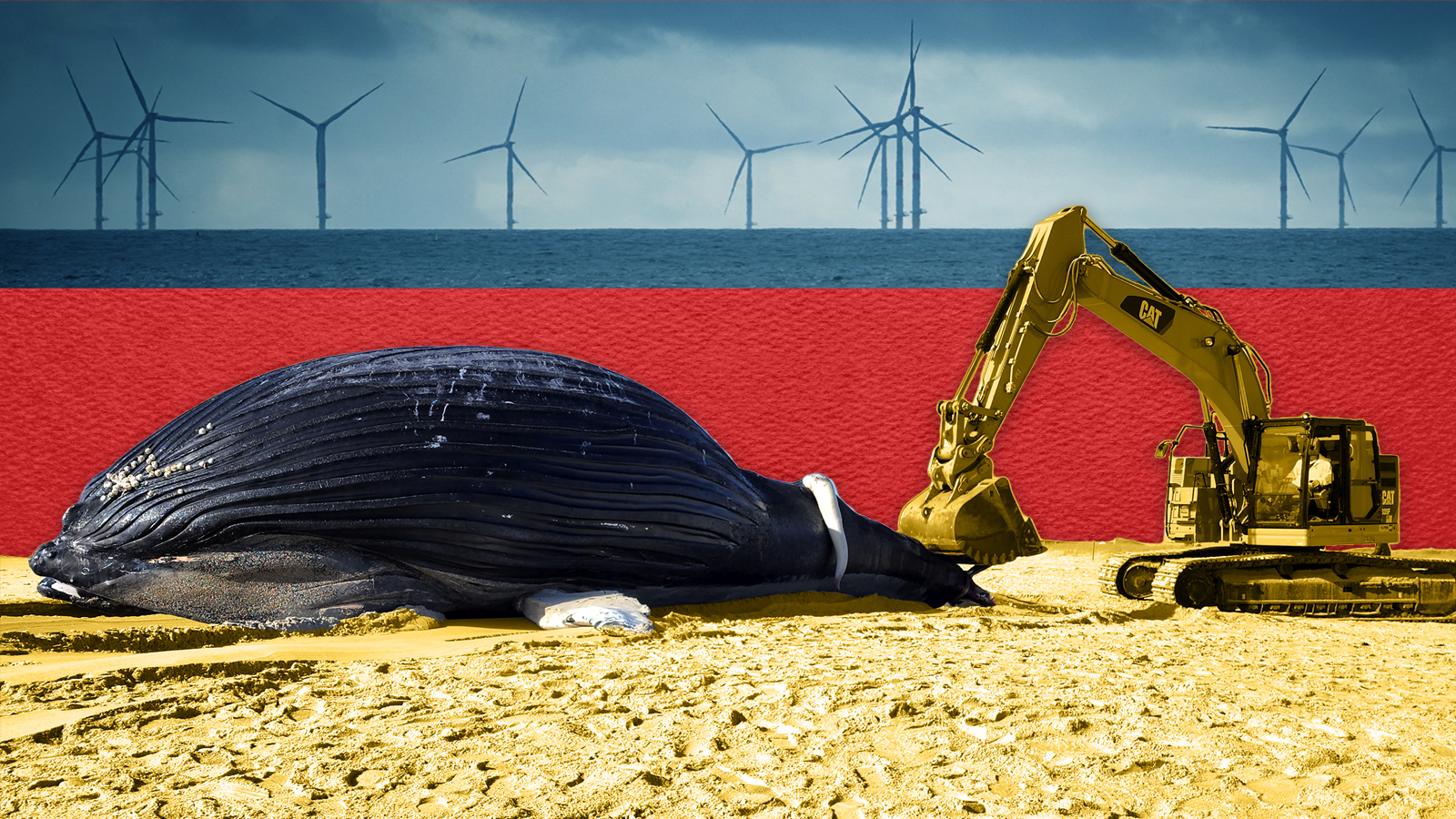How offshore wind projects came to be wrongly blamed for whale deaths
A string of whales washing ashore has put new wind energy development in the hot seat


A free daily email with the biggest news stories of the day – and the best features from TheWeek.com
You are now subscribed
Your newsletter sign-up was successful
A series of whale deaths across New York and New Jersey have sparked speculation — and misinformation — about the dangers of offshore wind projects. Here's everything you need to know:
What is happening?
Since Dec. 2022, 23 whales have washed ashore along the East Coast, with 12 of them in the New York and New Jersey area alone, The New York Times reports. The majority of the deaths have been humpback whales. The National Oceanic and Atmospheric Administration (NOAA) deemed the deaths an "unusual mortality event" that actually began in 2017; however, "activist groups, politicians, and the media are falsely framing the [recent] New York and New Jersey strandings as unprecedented," according to the Yale School of Environment. For example, New Jersey state Sen. Vince Polistina (R) commented, "It's hard to believe that the death of [these] whales on our beaches is just a coincidence."
One of the whale deaths, which occurred on Jan. 12, was confirmed to be due to "blunt trauma injuries consistent with those from a vessel strike," according to the Marine Mammal Stranding Center. Upon investigation, "post-mortem examinations have suggested that ship strikes are likely the cause of many of the deaths," the Times continues.
The Week
Escape your echo chamber. Get the facts behind the news, plus analysis from multiple perspectives.

Sign up for The Week's Free Newsletters
From our morning news briefing to a weekly Good News Newsletter, get the best of The Week delivered directly to your inbox.
From our morning news briefing to a weekly Good News Newsletter, get the best of The Week delivered directly to your inbox.
Scientists have yet to determine a specific reason for the increased collisions, and in turn, "an unlikely coalition of wind opponents, local environmental groups, and conservative talk show hosts have zeroed in on offshore wind as the culprit," Bloomberg explains.
These pointed fingers came just as the Biden administration set a goal of ramping up offshore wind projects along the East Coast with the hopes of raising offshore energy capacity to 30 gigawatts by 2030 along with the support of 11 east coast governors. New Jersey set a particularly ambitious goal of powering 3.2 million homes with offshore wind energy by 2035. The largest offshore wind farm was approved off the coast of New Jersey.
As a result, energy companies including Ørsted and Atlantic Shores began surveying the coastal regions with ships and sonar, aligning with the time of the whale deaths. "The work related to offshore wind projects is the primary difference in our waters," Polistina said, claiming that the deaths must be related to the increase in offshore wind development activity.
"The proximity of nearby offshore wind development has raised concerns that ongoing activity on these projects may be contributing to whale fatalities," said Rep. Chris Smith (R-N.J.), calling for a moratorium on the projects. Fox News host Tucker Carlson also called offshore wind "the DDT of our time," referring to the whale deaths as "The Biden Whale Extinction."
A free daily email with the biggest news stories of the day – and the best features from TheWeek.com
In a similar vein, Clean Ocean Action has also called for offshore wind development to be stopped. The executive director of the organization, Cindy Zipf, said that the "unprecedented concurrent industrial activity," referring to the wind projects, "allows the harassment and harm of tens of thousands of marine mammals." She added that "federal and state agencies have been recklessly fast-tracking offshore wind development projects," per a press release from the organization.
Are wind farms to blame?
Despite the claims, the National Oceanic and Atmospheric Administration (NOAA) has reiterated that "there is no evidence to support speculation that noise resulting from wind development-related site characterization surveys could potentially cause mortality of whales," and there are "no specific links between recent large whale mortalities and currently ongoing surveys" required for wind projects.
Loud sounds and ships have been considered threats to whales, however, offshore wind projects are not the only things that cause such disruptions, Politico writes. Thousands of ships have passed through the area where the whales have been killed and were not associated with offshore wind development. "There is no information that would support any suggestion that any of the equipment that's being used in support of wind development for the site characterization surveys could directly lead to the death of a whale," commented Benjamin Laws of the NOAA Fisheries Office of Protected Resources.
The number of whale deaths has actually been increasing since 2016 — approximately 40 percent of them due to ships or getting tangled in nets, CNN writes. "Unfortunately, it's been a period of several years where we have had elevated strandings of large whales, but we are still concerned about the pulse over the past six weeks or so," said Sarah Wilkin of the NOAA Fisheries Office of Protected Resources.
NOAA has 12 authorizations for "Level B harassment" for offshore wind sites. This implies that there could be some disturbance to animals in the corresponding areas, however, it suggests "no injury, and certainly no mortality," according to Laws. Experts say that the survey equipment used for offshore wind is "not as intrusive to marine animals compared to the equipment used in oil and gas construction," reports CBS News. After the surveys, the ships used are required to slow their speed and must always have protected species observers on board.
Despite the controversy, many experts and activist groups tout the benefits of offshore wind in mitigating climate change and moving toward sustainable energy. "We're on the side of the whales, all we do is care about the whales," said Paul Eidman, leader of a chapter of the activism group Anglers for Offshore Wind.
"We're accepting the fact that humans have messed up and climate change is because of us," he said. "This is one of the ways we can stop burning fossil fuels; we're looking at the big picture."
So what's the cause?
One of the theories is that the whales are following prey into boat-infested waters, especially because the population of humpback whales, which have made up the majority of the recent deaths, has been increasing. "The fish are likely to be in areas where (shipping) channels are," explained Paul Sieswerda, executive director of the nonprofit Gotham Whale.
This shift in geographic location can be attributed to climate change. "We are seeing populations move around and go into areas that they haven't historically been in" due to warming oceans, according to Kim Damon-Randall, director of the NOAA Fisheries Office of Protected Resources.
Climate change has increased interactions between humans and animals, which may put whales at risk. "Ship strike and entanglement are real threats and they're happening continuously," Sieswerda said. "People are overlooking the obvious just because there's some news going on about wind farms."
What else is at play?
Those against offshore wind development "have found in the gruesome images of rotting whale carcasses a new 40-ton mascot," the Times writes. Some groups who have been vocal about whale deaths have also historically been against offshore wind development. "If an emotional response is what it takes...I'm not going to turn them down," remarked David T. Stevenson, leader of the nonprofit Caesar Rodney Institute, who previously stated he believes there is no climate crisis and offshore wind costs too much.
Another group, Protect Our Coast NJ, was also found to be "connected to a conservative think tank with a long history of opposing clean energy," per NPR, and has been vocal in connecting whale deaths to offshore wind. Oil and gas companies have also funded many of the environmental groups that have opposed wind development.
"Groups opposed to clean energy development are spreading misinformation," argued JC Sandberg, chief advocacy officer at American Clean Power Association. "They've seized on an opportunity to try and stop clean energy deployment along the East Coast."
"Blaming offshore wind projects on whale mortality without evidence is not only irresponsible but overshadows the very real threats of climate change, plastic pollution, and unsustainable fishery management practices to these animals," remarked Anjuli Ramos-Busot, New Jersey director of the Sierra Club,
Despite a push from two Republican congressmembers from New Jersey to pause offshore wind development, New Jersey Gov. Phil Murphy (D) says the work will continue.
Devika Rao has worked as a staff writer at The Week since 2022, covering science, the environment, climate and business. She previously worked as a policy associate for a nonprofit organization advocating for environmental action from a business perspective.
-
 How the FCC’s ‘equal time’ rule works
How the FCC’s ‘equal time’ rule worksIn the Spotlight The law is at the heart of the Colbert-CBS conflict
-
 What is the endgame in the DHS shutdown?
What is the endgame in the DHS shutdown?Today’s Big Question Democrats want to rein in ICE’s immigration crackdown
-
 ‘Poor time management isn’t just an inconvenience’
‘Poor time management isn’t just an inconvenience’Instant Opinion Opinion, comment and editorials of the day
-
 Russia’s ‘cyborg’ spy pigeons
Russia’s ‘cyborg’ spy pigeonsUnder the Radar Moscow neurotech company with Kremlin-linked funding claims to implant neural chips in birds’ brains to control their flight, and create ‘bio-drones’
-
 How roadkill is a surprising boon to scientific research
How roadkill is a surprising boon to scientific researchUnder the radar We can learn from animals without trapping and capturing them
-
 The ocean is getting more acidic — and harming sharks’ teeth
The ocean is getting more acidic — and harming sharks’ teethUnder the Radar ‘There is a corrosion effect on sharks’ teeth,’ the study’s author said
-
 Cows can use tools, scientists report
Cows can use tools, scientists reportSpeed Read The discovery builds on Jane Goodall’s research from the 1960s
-
 How climate change is affecting Christmas
How climate change is affecting ChristmasThe Explainer There may be a slim chance of future white Christmases
-
 Why scientists are attempting nuclear fusion
Why scientists are attempting nuclear fusionThe Explainer Harnessing the reaction that powers the stars could offer a potentially unlimited source of carbon-free energy, and the race is hotting up
-
 Parthenogenesis: the miracle of 'virgin births' in the animal kingdom
Parthenogenesis: the miracle of 'virgin births' in the animal kingdomThe Explainer Asexual reproduction, in which females reproduce without males by cloning themselves, has been documented in multiple species
-
 Canyons under the Antarctic have deep impacts
Canyons under the Antarctic have deep impactsUnder the radar Submarine canyons could be affecting the climate more than previously thought
